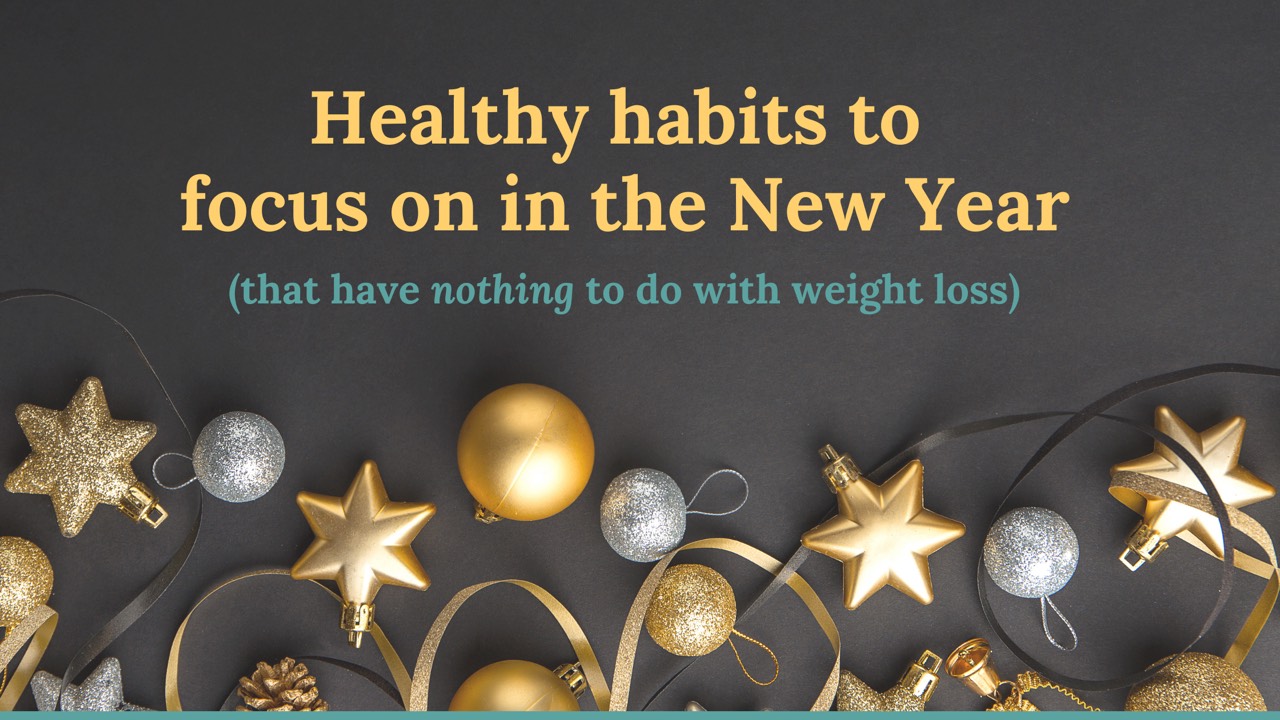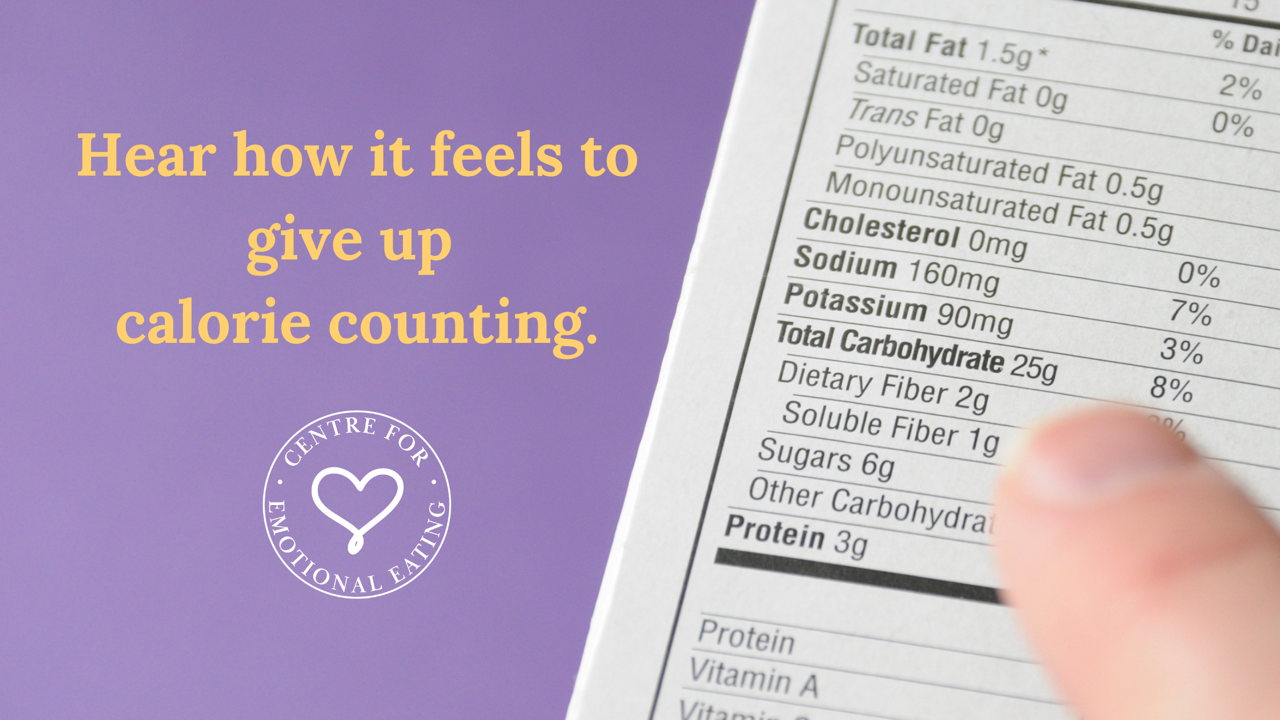BLOG
Find support not just for emotional eating, but all aspects of your well-being.
How to Explain Emotional Eating to Others

There may come a time on your journey where you feel like you want to explain how and why you emotionally eat to those you trust. You might feel in your gut that you would benefit from opening up and sharing your experiences. But emotional eating is complex, where should you even begin? We’ve got a number of concrete examples below to help guide you!
We want to be clear: you don’t have to explain or justify your feelings or actions to others. This post is intended to support those who feel like speaking about their experiences to someone they trust will help support them on their journey. Remember: no one gets to comment on your body (even if it is weight loss).
A good first step is to check in with your person and see if they have capacity for you to share. This can set the tone of your interaction by encouraging limiting distractions, finding a quiet space, and making sure they are in a good mental place to support you.
Start by explaining the link between emotions and food, that ...
5 Reasons Why You Emotionally Eat at Night (And what to do about it)

We recently asked our followers what time of day they feel is the worst for their emotional eating. And an overwhelming number of you said night time. Know that you are not alone! It is incredibly common to have the evenings be a time where emotional or binge eating ramps up. And there are very good reasons why you overeat late at night, and none of them are because you’re “crazy” or “lack willpower.” Here are 5 common reasons emotional eating comes up at night and what you can do to address each one.
You ate how you “should” during the day. Restricting what and how much you eat throughout the day will ultimately lead to binge eating (even if you are trying to “reset” from your last binge!). Not only is your body asking for more food, it is asking for food that is pleasurable. At the end of the day, you’re left feeling hungry and unfulfilled.
- Solution: No matter what you ate the night before, start the next day off with a clean slate: have foods you enjoy all day or earlier in the ...
3 New Year’s Resolutions That Aren’t About Your Weight

January always has that fresh feeling! There are 12 months to come and the possibilities feel endless. This might give you the knee-jerk feeling to set all the goals, including weight loss ones. You might be thinking, in this atmosphere that feels like anything is possible, that *this* year is the one you “lose the weight for good.” You’ve made a grocery list, thrown out the last of the holiday foods, and you signed up for that new gym membership.
But did you know that about 95% of diets fail? January might feel new and exciting, but many weight loss resolutions end before it even becomes February. That’s because restriction sets you up for binge eating—it becomes a cycle where you are depriving yourself “on the wagon” and then feel out of control when you give into cravings.
Instead of focussing on the number on the scale, here are examples of New Year’s resolutions to support your mind, body, and soul!
Add happiness habits.
You’ll notice this one is about adding in new things, in...
What is Holiday Perfectionism? (And How to Let Go if It!)

Holiday movies and social media show us that the holiday season needs to be a certain level of perfect: everyone must be happy, your house must be spotless but also have decorations everywhere, and key memories have to be made. This is what is considered holiday perfectionism, when everything must be done to a certain level or else you feel stressed out, disappointed in yourself, or like a failure.
Women are especially susceptible to falling into the trap of holiday perfectionism because they constantly get messages from childhood to be everything to everyone. They are the ones to make the gift lists, do the shopping, the baking, coordinate the social calendars of spouses and kids. Plus, there is a gender stereotype that women need to be pleasant in the face of any scenario. It is exhausting!
Give yourself a break this year with these 4 tips to feel less stressed about achieving perfection this season:
- Take stock of what you can let go of. Consider what you think is expected of yo ...
The Solution to Eating out of Loneliness? Connection!

You might think of emotional eating as something that comes up for you when you have strong feelings like anger, stress, or sadness. These are emotions that are usually easy to identify by your inner dialogue or your outward reactions like tears or yelling. But emotional eating can sneak in with all kinds of feelings.
Ones you may not have thought about is eating when you’re bored or lonely. These reasons for overeating can be challenging to identify because we often do them without any sense of awareness. You’re not feeling overly emotional and yet you find yourself walking the same route to the fridge or pantry thinking it is simply routine.
When you’re bored or lonely, food as a solution to missing a connection makes sense. Your favorite treats feel comforting, plus they are easily available—it never lets you down or doesn’t show up (like you might be feeling about people).
The first thing to do is to find out what kind of connection you’re looking for: is it a social connection ...
Client Insight: “It was scary, but I’m glad I stopped counting calories.”

The following blog posts talks about calorie counting in some detail. If this is something that might bring up negative feelings for you, please skip this post to protect your mental and physical health. 💛
After eating emotionally you might be thinking you need to do a complete 180 and get really strict about what and how you’re going to eat next. A common way to feel in control of your eating is to count your calories. It’s become so easy these days as the diet industry has created apps that are always in the palm of our hands and can even scan labels!
Often clients will be able to white knuckle their way through a few days of eating low calorie only to find themselves binge eating at the first sign of stress, alone time, or even faced with a dinner they can’t ‘log’. And it can feel like being right back where you started after the initial overeating episode.
Very often it feels scary to let go of counting calories, but doing so can bring you back in-tune with your body in a way yo...
Letting Go of Food Rules

A lot of emotional eaters use food rules to try and control their eating. This might look like:
- Counting calories, points, or macros.
- Not eating after 7:00 p.m.
- Not eating or limiting carbs, sugar, or fat.
- Leaving food on your plate.
- Drinking coffee or diet soda to fend off hunger.
Sound familiar? These rigid rules are a reaction to the out-of-control-feeling experienced when strong emotions take over and you head to the fridge looking for something to numb out on. We learn rules from our parents, friendship circles, diet culture, and social media. These rules also make you feel as if you are in control (at least for a little while), which makes it extra frustrating when you “fall off the wagon.”
It may seem logical to try and balance situations where you eat a lot of food with other times of much less food, but the truth is it doesn’t even out that way… And you end up getting stuck in the restrict/binge cycle. This looks like: strict diet > have a craving or emotional exper...
3 Good Things That Can Come from a Binge

Binge eating feels all encompassing. You feel helpless to stop what and how much you are going to eat, and chances are you are doing it in the moments where you are alone. Here are three signs you may have missed during a binge and how to feel better prepared the next time this urge comes up for you:
- That moment when you decide to give into a binge, even when you know it won’t make you feel good in the long run, is actually a good sign. Even if you continue with the binge, you’ve made a mental note that there is an ‘after’ to the binge. We are absolutely not applauding the guilt and shame that comes post-binge but knowing that you are going to get through the binge is the beginning to being able to think beyond it—showing you’re not so afraid of what life might send your way next!
- What do to next: tell yourself, out loud even, that “I am going to get through this.” Speaking to yourself in this way creates a kind of pep talk that can allow some positivity (and even empowerment) co ...
Not All Emotional Eaters are Overweight

When TV shows and media show us what an emotional eater looks like, it is usually someone who would be categorized as obese by the BMI chart. Their rolls and double chin are highlighted to create a character that seems lazy or is the punchline in a few jokes. Not only is this incredibly harmful messaging to those in bigger bodies, it also isn’t indicative of the experience of all emotional eaters.
But there is no one body type for emotional eaters, it can affect anyone.
They could identify as male or female.
They could be a preteen or a person in their 50s.
They could be from any cultural background.
They could reach for savoury or sweet foods when an emotion comes up.
What they do all have in common is that is that they eat to sooth themselves. When a feeling comes up that they can’t manage or don’t want to feel, they reach for food as a distraction, to numb out, even to bring some control or joy to the moment.
While from a caloric perspective, it is true that eating more than ...
What to do When You’re Feeling Lonely During the Holidays

The holiday season often feels like it is an emotional minefield. It can bring up memories of our childhood or longer hours at work. It can exacerbate anxiety with the increase in social situations or kick perfectionist into high gear when we decorate, plan, and host.
But one of the most painful emotions to come up during the holidays can be loneliness. We’re reminded of family we’ve cut ties with or loved ones who have passed away. Maybe even friends you once would have celebrated with are no longer close by. And it isn’t always a physical distance, sometimes we may feel like we’re not relating to our community as they manage their own holiday stressors and expectations. For a season that is about connecting with others, it can really hit home that our family and friends’ groups have gotten smaller or busier.
While feeling lonely during the holidays might not be entirely avoided, there are ways to plan and manage it, so it feels less like a rollercoaster you can’t get off until Jan...


